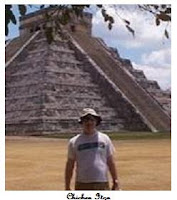Guest Post: Jack Brody (author of The Moroni Deception) + Giveaway
Today, I have a very excellent guest post from Jack Brady the author of The Moroni Deception on "Why I Write". Hope y'all will enjoy his great post.
About the author:
About the author:
Jack Brody is a writer, ex-military, and an avid traveler. After his Army stint and then deciding to pass on law school, he went to film school, wrote screenplays, and held a number of jobs which ran from everything to working for a newspaper for one day, to film production, to then going into real estate (with at least five others along the way). He's fascinated by history, politics, and architecture, all of which play a part in his novels (yes, he already has two more in the works). When not writing, he can often be found hiking with his two faithful dogs, occasionally breaking out the old BMW bike for a ride though the mountains, or playing volleyball or bar trivia with his friends. He divides his time between his home in the Southern Appalachians and wherever his passport will take him. After reading Jon Krakauer's bestselling "Under the Banner of Heaven," he was inspired to undertake a full year of research in preparation for the novel. Taking what he'd learned, along with a bit of imagination, the result was the conspiracy thriller, The Moroni Deception.You can read more about Jack Brody's The Moroni Deception on his website.
Why I Write
The following is a quote from the late Kurt Vonnegut, my favorite writer when I was in my late teens."Go into the arts. I'm not kidding. The arts are not a way to make a living. They are a very human way of making life more bearable. Practicing an art, no matter how well or badly, is a way to make your soul grow, for heaven's sake. Sing in the shower. Dance to the radio. Tell stories. Write a poem for a friend, even a lousy poem. Do it as well as you possibly can. You will get an enormous reward. You will have created something."And I would agree. While I loved listening to and reading stories growing up, I loved making them up and telling them even more. When I was in high school and feeling like I didn't really belong (which I later learned almost everybody else felt that way), while I played sports and participated in various extracurriculars to have some interaction with other human beings, I turned mostly to books and films to find those who I could relate to (J.D. Salinger and Kurt Vonnegut are the first two who come to mind) and who I believed understood me--which again, I later found was not that unusual. Somewhere along the line I got the crazy idea that maybe I could create the stories that people would shell out a few dollars for to go watch in the dark for a couple of hours. I think it was not long after I'd read A Confederacy of Dunces, still my all-time favorite novel, shortly before going off to college, that I got it in my head to become a filmmaker, because an Academy Award-winning movie, I felt, absolutely had to be made of this amazing novel (although, surprisingly, after numerous starts and stops, it has still yet to be made).
I was fairly certain, however, they wouldn't turn over the keys of a $50 million movie to an 18 year old, so I would have to somehow work my way up to find myself in a position to one day get that film made (as well as Kurt Vonnegut's Sirens of Titan, another of my all-time top five novels). At that time in the 80's, I didn't have a very clear idea of how to do that, although at some point it occurred to me perhaps through writing I might. Prior to that, aside from multiple research papers I recall writing on either Porches or Vlad Tepes, the historical Dracula, all I had written were a few short humorous skits in high school which had never been more than maybe 5 or 6 pages (I vaguely remember an updated version of Antigone that I wrote, enacted with clay figures in a shoebox stage and performed in the vein of Mr. Bill, in which everyone died a gruesome Mr. Bill-like death in the end--and if you don't know who "Mr. Bill" is, ask your parents, or maybe even your grandparents). Looking back, though, now, I realize I also wrote for not only my high school and college newspapers, but at the end of my 3 year Army stint, I was editing and writing most of my battalion's newsletter.
Clearly this compulsion to write was a part of me, but yet during this entire time I had never really thought of myself as a writer. Perhaps in my youth I somehow thought of it as effete to write, or perhaps there were no writers I had ever heard of who I really wanted to emulate since it seemed like most of them were either alcoholics, drug addicts, recluses, mildly crazy, or at the least badly depressed. Even John Kennedy Toole, the writer of my very favorite novel committed suicide before his opus had even been published (or discovered for that matter--his mother solicited the help of famed Southern writer, Walker Percy, to get publishers to finally take a look).
After the Army (during which time I'd also attended a night-time filmmaking program) I worked on several films in production (at the low end--not producing), and then went on to a film program at NYU. After that I worked in a number of different (relatively menial) jobs, all the while working mostly on my film scripts, the first of which I'd started writing while still in college. The first two were mostly autobiographical comedies, both probably pretty bad (they're lost to the ages now), but both I'm sure were necessary to get out all the biographical stuff that writers need to sometimes first get out of their systems and move past. Which is not to say that your personality and everything that you've gleaned from your life experience shouldn't be used, but all the little real life episodes that probably seemed so cool and hilarious and in which you probably starred in, probably really don't have the makings of anything much more than a short story (I don't know if it was true, but T.C. Boyle's "Greasy Lake" is a classic "you won't believe what happened the other night" story). After I got the first two out of my system, I went onto to complete five pretty good ones (okay, four, but the fifth one is probably the one that would have racked up at the box office), although none were ever produced. Without going into too much detail, I did, however, send my very favorite, and probably best one off to two different director/producers I'd made the acquaintance of in somewhat roundabout ways. Both I'm fairly certain (read my script and then watch their two movies) went onto "borrow" large chunks of my screenplay for their films, both, of course, without any acknowledgement or payment.
That repeated experience definitely took the wind out of my sails with regards to breaking into the film industry (which I've since gone on to learn that plagiarism and outright theft is apparently an everyday occurrence, and merely viewed as a cagey business move if you change just enough of it to keep it from being identical, as opposed to something reprehensible, as its regarded in the academic and literary world). I still love movies, but along with those episodes, I've since found myself reading a great deal more, especially now that I also seem to have "aged out" of the demographic that most films are made for. As far as writing The Moroni Deception, I'd always thought of trying to write a novel, and, in fact, had made several half-hearted attempts over the years, but never really had either an interesting enough story, or enough of a story to complete an entire novel--that is until I happened across Jon Krakaur's Under the Banner of Heaven. It was then I knew I had found my source material, and I was so confident I then went on to research the LDS faith for a full year before I ever really even put pen to paper (other than for the copious notes I took).
Looking back, the interesting thing I find about this whole writing evolution is that it was never just about making money. In fact, it's not been until just fairly recently that I've finally been able to even see the first dime. Yes, part of my hopes in all of this was to write professionally full-time one day, but the main reason, I truly believe, was just as Mr. Vonnegut said, to feed my soul, to "create something" as " a way of making life more bearable." For the younger readers (and those few older one to which this applies) I would just conclude with the advice that if you've not yet found your creative outlet, I would highly recommend that you do. While I won't go so far as to say that it's the meaning of life (that would, of course, be "to love and be loved" which I learned from Peter O'Toole in the film, Creator--and biologically speaking, to procreate), but it will give a richness and an added layer to your life that if you haven't yet discovered, you will treasure when you do.
The Moroni Deception by Jack Brody, July 31, 2012. Published by Visigoth Press.
Open to residents of the US
Must be 16+ to enter.
a Rafflecopter giveaway
Michael Chenault, award-winning investigative journalist with the New York Times, is rousted in the middle of the night by NYPD detectives and accused of the bizarre murder of a complete stranger. After clearing himself, Chenault finds that Martin Koplanski, the retired history professor he’d been accused of murdering, was likely killed for a mysterious Mormon relic long thought to be just a myth. Twenty-four hours later, Chenault receives an email with a photo of the recently murdered wife of Presidential candidate, Brockston Ratchford. She too appears to have been ritually killed in the exact manner as Koplanski, right down to having the same cryptic character scrawled in blood across her forehead. With way more than just a hunch to now go on, Chenault heads out to Salt Lake City, the site of the Ratchford murder investigation, to find out what, if any, connection there is between the murders.Giveaway:
With the help of a beautiful young reporter he meets along the way, Chenault comes to learn the dark family secrets of a rising political star, along with the rather strange but true history of the Mormon church. As he pieces the story together of what appears to be an ever-growing conspiracy, Chenault is pursued by The Brothers, two murderous zealots who will stop at nothing to retrieve the Mormon relic Chenault is also trying to find. What Chenault eventually discovers is that what he’s uncovered may not only affect the outcome of the next Presidential election, but decide the fate of an entire religion–if he can manage to stay alive.
Open to residents of the US
Must be 16+ to enter.
a Rafflecopter giveaway




Comments
Post a Comment
All comments are moderated! Let's keep it clean, y'all!